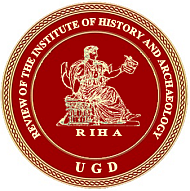FROM PHILOPAPPUS TO ARISTIDES AND BACK – RETHINKING THE TRANSFORMATIONS OF THE IDEAS AND IDEOLOGY OF ROMANNESS DURING THE II CENTURY
Abstract
The contemporary research of the Roman oikumene has been incrementally moving away from the traditionally dominant paradigms of authority and power, and leaning towards diversity, flux of identities and connectivity. However, these paradigm shifts haven't undermined the importance of the phenomenon of Roman imperialism - as global rule over the united word. In contrary, it provided a deeper understanding in the complexity of factors that influenced the process, and opened the way for new, less Eurocentric, analyses of the phenomenon.
This paper argues that the transformation of the Roman world, and the wider globalized “Old World” is embedded in the local identities, world views, aspirations, capacities and interests of the eastern-Mediterranean elites developed during the Hellenistic period.
It emphasizes that the Roman interventions and gradual domination in the Eastern Mediterranean exposed Rome and later on different non-Mediterranean parts of Europe on plethora of influences of the extremely globalized world of the Hellenistic Eastern Mediterranean and the Near East. The Eastern elites brought a colorful assortment of diverse expressions, rituals, traditions and narratives to the new Roman oikumene. However, the cultural and religious traditions of the eastern Mediterranean local elites were profoundly influenced and inspired by the specific Hellenistic amendments of the long-lasting Near-Eastern model of imperialism.


